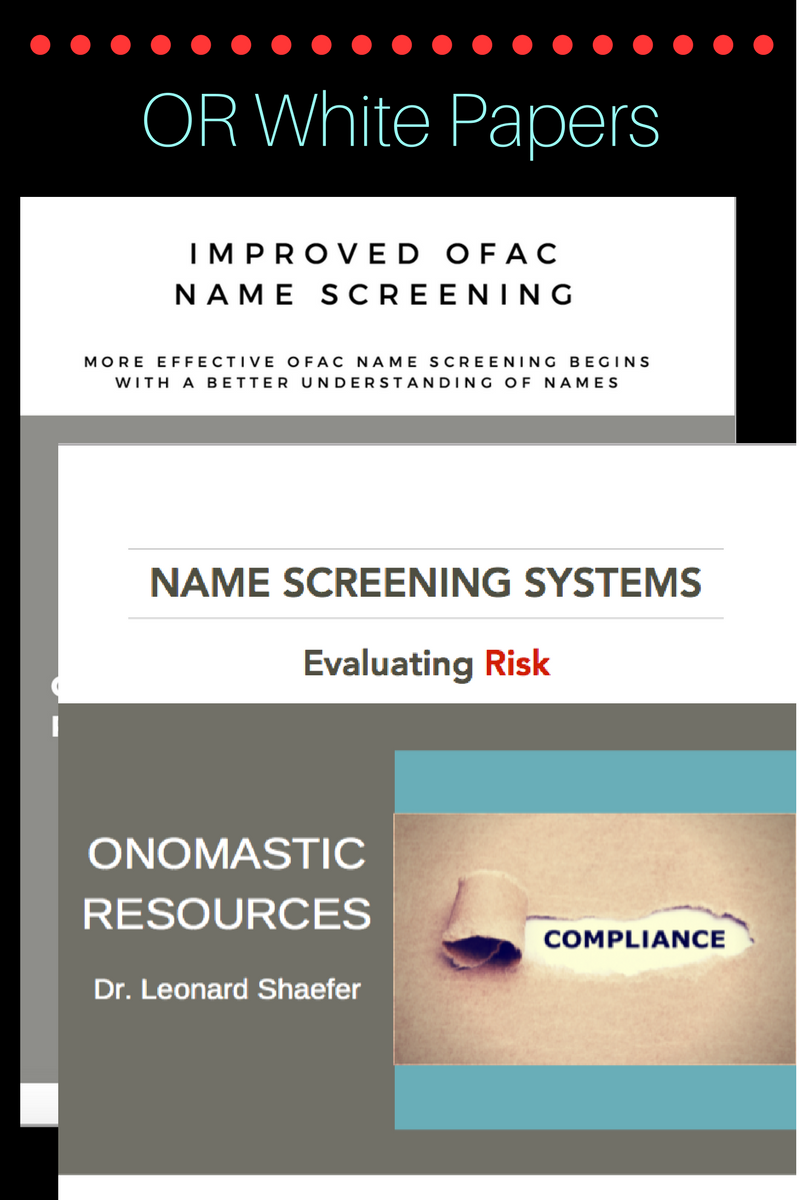Category: Name Variations
Know Your Data: OFAC and Hispanic Names

Why KYD Matters In my previous post, there was a chart that shows the extent to which a relatively small number of name-models predominate in OFAC SDN data. My ultimate purpose in providing that graphic was two-fold: To show that reliance on mediocre, Anglo-centric name-screening techniques such as SOUNDEX and …
Be like…Màikè’ěr·? Or not.

Ah, the many drawbacks of fame and fortune… One of the most spectacularly successful examples of personal branding on the planet is: Màikè’ěr· Qiaodan. What’s that? Never heard of him? That’s odd, because at least a billion other people know him very well. The know his soaring silhouette, his profile, …
Provenance Is Destiny, Or “Where Did You Get That Name?”
Korean Names in the Anglophone World

According to the 2010 U.S. Census, there are some 1.7 million U.S. residents who identify themselves as being principally of Korean descent . Many large cities across the U.S. have sizeable Korean communities, and these communities generate a significant amount of commercial activity. For these reasons and more, it is …
Tchaikovsky and Chekhov; Tchernobyl,Chernobyl and Tschernobyl
What is the state of the art for name-processing?
What is name-centric processing?

The term name-centric processing refers to any automated or manual process in which a successful outcome is wholly or principally dependent on technologies and human judgment applied to named entities (NEs). Such processes can range in complexity from a simple membership look-up to sophisticated, real-time assessments of vital intelligence data …
Why are names important?

Data assets are among the most valuable resources that an organization possesses. Many tools and technologies have been made available in the marketplace in recent years to help organizations exploit these data assets more effectively, in order to advance organizational goals or to gain a competitive advantage. This is the …
Know Your Data: OFAC and Hispanic Names

Why KYD Matters In my previous post, there was a chart that shows the extent to which a relatively small number of name-models predominate in OFAC SDN data. My ultimate purpose in providing that graphic was two-fold: To show that reliance on mediocre, Anglo-centric name-screening techniques such as SOUNDEX and …
Be like…Màikè’ěr·? Or not.

Ah, the many drawbacks of fame and fortune… One of the most spectacularly successful examples of personal branding on the planet is: Màikè’ěr· Qiaodan. What’s that? Never heard of him? That’s odd, because at least a billion other people know him very well. The know his soaring silhouette, his profile, …
Provenance Is Destiny, Or “Where Did You Get That Name?”
Korean Names in the Anglophone World

According to the 2010 U.S. Census, there are some 1.7 million U.S. residents who identify themselves as being principally of Korean descent . Many large cities across the U.S. have sizeable Korean communities, and these communities generate a significant amount of commercial activity. For these reasons and more, it is …
Tchaikovsky and Chekhov; Tchernobyl,Chernobyl and Tschernobyl
What is the state of the art for name-processing?
What is name-centric processing?

The term name-centric processing refers to any automated or manual process in which a successful outcome is wholly or principally dependent on technologies and human judgment applied to named entities (NEs). Such processes can range in complexity from a simple membership look-up to sophisticated, real-time assessments of vital intelligence data …
Why are names important?

Data assets are among the most valuable resources that an organization possesses. Many tools and technologies have been made available in the marketplace in recent years to help organizations exploit these data assets more effectively, in order to advance organizational goals or to gain a competitive advantage. This is the …




![Headline from BC Russian-Language Service, May 2015 [Russian]](https://www.onomasticresources.com/wp-content/uploads/2015/05/BBC-Russian.png)


